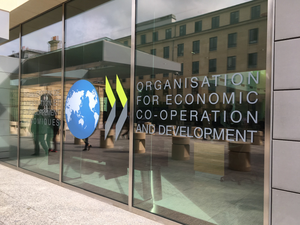Businesses
Merchants across India continue to use Paytm & its pioneering devices
New Delhi, Feb 22 (IANS) One 97 Communications Limited (OCL), that owns financial services major Paytm, has received immense support from the merchant community across the country.
In a social media livestream organised by the company, merchants across India, including from Mumbai, Pune, Noida, Hyderabad, Chennai, Ahmedabad and Bengaluru, among other cities, spoke about their Paytm journey.
During the live event, merchants expressed satisfaction with Paytm’s devices, including QR code scanners, Soundbox technology, and Card Machines, which they have been using for 4-5 years.
They assured that they will continue using Paytm’s iconic devices, while sharing their experiences.
Merchants including medium and small enterprises are rapidly adopting new-age payment technology in order to offer hassle-free shopping experiences to their customers.
The company pioneered QR code, Soundbox, and online financial services, facilitating the growth of street vendors and small businesses by enabling them to accept mobile payments.
Yogesh from New Delhi said he has been using Paytm for the last 3-4 years and will continue to use the devices.
“I have never faced any issue in receiving payments through the devices. Paytm has given convenience to every user,” he added.
They added that the devices are convenient to use and the platform offers great customer service.
Merchants also emphasised that they have encountered no settlement issues, expressing their fondness for Paytm by saying, ‘Paytm karte raho, aage badhte raho.”
Another merchant, Yaseer Sheikh from Pune said he has been using Paytm QR and Sound Box for many years and both were working seamlessly.
Also, Kartik from Mumbai said, “For young entrepreneurs like us, Paytm’s products are user friendly, cost effective, and makes payments solutions easier.”
From bustling metropolitan cities to the remotest corners of India, Paytm has extended mobile payment services to even the most far-flung areas of the country.
A Paytm’s Spokesperson said: “Our merchant partners are the backbone of Paytm’s success, and we are grateful for their unwavering support. Our pioneering devices Paytm QR, Soundbox and Card Machine will continue to work as always. We remain committed to fostering a strong relationship with our merchants, built on trust and transparency.”
–IANS
na/prw
Businesses
India to see rise in private consumption in FY25 driven by rural demand

New Delhi, July 11 (IANS) Driven by rural demand recovery owing to normal monsoon and moderating inflation, India is projected to see a surge in private consumption in the current fiscal, a report has said.
According to India Ratings and Research, the rise in private consumption would lead to more balanced growth, reducing the disparity between premium and value segments.
According to the report, urban demand will also continue to grow but at a slower pace.
The growth disparity would moderate in FY25, exhibiting slightly more broad-based growth contours, said India Ratings.
There has been a constant rise in rural consumption demand in recent years.
Riding on a revival in rural demand and steady urban growth, the fast-moving consumer goods (FMCG) sector in India is also projected to see a revenue growth of 7-9 per cent this fiscal.
According to a recent Crisil Ratings’ study of 77 FMCG companies, “We expect volume growth of 6-7 per cent in fiscal 2025 from the rural consumers (40 per cent of overall revenue), supported by expectation of better monsoon benefitting agricultural production, and hike in minimum support price supporting farm incomes.
According to the report, higher government spending on rural infrastructure, primarily through Pradhan Mantri Awaas Yojana-Grameen (PMAY-G) for affordable houses, will aid higher savings in rural India, supporting their ability to spend more.
On the other hand, according to the Crisil report, volume growth from urban consumers will remain steady at 7-8 per cent during fiscal 2025 supported by rising disposable incomes and continued focus on premium offerings by the players, especially in the personal care and home care segments.
The food and beverages (F&B) segment is expected to grow 8-9 per cent this fiscal, aided by improving rural demand.
–IANS
na/dpb
Businesses
Five automakers to recall over 1,56,000 cars for faulty parts

Seoul, July 11 (IANS) Kia, Nissan Korea and three other carmakers will voluntarily recall more than 1,56,000 vehicles due to faulty components, the transport ministry here said on Thursday.
The five companies, also including Hyundai Motor Co., Porsche Korea and Toyota Motor Korea Co., will recall 1,56,740 units of 32 different models, the Ministry of Land, Infrastructure and Transport said in a statement.
The problems that prompted the recall include poor durability of the electronic control hydraulic unit of 1,39,478 units of the Sorento SUV model, reports Yonhap news agency.
Also, 8,802 vehicles across eight Nissan models, including the Q50 model, were found to have defective manufacturing of the propeller shaft.
Hyundai’s luxury brand Genesis will recall 2,782 GV70 units due to defective engine ignition connection bolts. Porsche Korea will recall 2,054 vehicles across 17 models, including the 911 Carrera 4 GTS Cabriolet, due to a safety issue involving the lane-keeping function.
Toyota Korea will recall 737 vehicles across three models, including the Prius 2WD, due to a defect in the rear door external handle, the ministry said.
–IANS
na/dpb
Businesses
OECD brands New Zealand as a 'red tape country'

Wellington, July 11 (IANS) New Zealand is a country full of regulatory barriers, said a survey released by the Organisation for Economic Cooperation and Development (OECD) on Thursday.
New Zealand Minister for Regulation David Seymour stressed the need for New Zealand’s regulatory reform, citing areas that are found to be particularly overregulated including barriers to foreign direct investment, acquiring licences and permits, and administrative and regulatory burden.
“It is too difficult to invest, and Kiwis have their productivity sapped because of the time spent complying with edicts from Wellington,” Seymour said.
The result from the five-yearly OECD Product Market Regulation Indicators should end any and all doubt that the government must go to war on red tape and regulation, he said.
The quality of regulation in New Zealand is in freefall, from being ranked second in 1998 to twentieth in this year’s survey, he said, adding that it is no coincidence that New Zealand experienced strong productivity growth in the 1990s but has fallen behind since.
The Ministry for Regulation aims to cut existing red tape with sector reviews, to improve the scrutiny of new laws, and to improve the capability of the regulatory workforce.
“The culture of lawmaking needs real change, so Kiwis spend less time complying, and more time doing. The end result is higher wages and lower living costs,” the minister said.
The OECD survey, of about 1,000 questions, assesses the degree to which policies and regulations promote or inhibit competition in product markets.
–IANS
int/rs/kvd
Businesses
Union Budget: PM Modi to meet prominent economists today

New Delhi, July 11 (IANS) Prime Minister Narendra Modi will on Thursday hold a meeting with leading economists to discuss the Union Budget 2024-25.
The budget will be presented by Finance Minister Nirmala Sitharaman in Parliament on July 23. The Budget Session will start on July 22 and conclude on August 12.
Economists, industry experts and Niti Aayog Vice Chairman Suman Bery will discuss the fiscal situation and strategies, and also present views and recommendations to the Prime Minister at the meeting, according to sources.
This will be the first Budget of the Modi-led government in its third term at the Centre.
PM Modi returned to the national capital on Thursday morning after concluding his two-nation visit to Russia and Austria.
Last month during her address to a joint session of Parliament, President Droupadi Murmu indicated that the government would come out with historic steps to accelerate the pace of reforms.
Finance Minister Nirmala Sitharaman has held discussions with various stakeholders, including economists and captains of industry on the forthcoming Budget.
–IANS
dpb/
Businesses
MSMEs key to making India a leading electronics manufacturing destination: MeitY Secy

New Delhi, July 10(IANS) The Micro, Small, and Medium Enterprises (MSME) sector can play a key role in making India a leading electronic manufacturing destination, S. Krishnan, Secretary, Ministry of Electronics and Information Technology (MEITy), said on Wednesday.
In his address at the CII MSME Growth Summit here, he said that this can be achieved by increasing the proportion of domestically manufactured components.
“Manufacturing will play a major role in the structural transformation of the Indian economy and electronics will be an important sector driving this transition. We should enhance domestic value-add in electronics from 18-20 per cent to 35-40 per cent within the next five years,” Krishnan said.
“MSMEs will play a crucial role in this effort and have a huge role to play in electronics components manufacturing.”
He emphasised the huge potential that digitisation holds to be a game changer for the MSME segment. Adoption of technology by smaller players through cluster-based facilities and retrofitting existing facilities are cost-effective ways to go digital for this segment.
Underlining the importance of a digital economy, he said that MeitY is working to assess the size of the digital economy in the country.
Dr Ishita Ganguli Tripathy, Additional Development Commissioner, Ministry of MSME, highlighted that women’s participation in registered MSMEs needs to be increased from 39 per cent. She emphasised leveraging the “7 As” to empower women: availability, accessibility, affordability, awareness, accountability, alliance, and achievement.
She added that educating MSMEs about regulatory requirements and ESG compliances is essential for their sustainable growth.
Government and large enterprises can play an important role in supporting MSMEs and MSMEs must leverage the digital ecosystem, said T Koshy, Managing Director & CEO, Open Network for Digital Commerce (ONDC).
He added that the network is also adding insurance as a new component which will be visible soon.
–IANS
rvt/vd
-
Video1 year ago
PM Modi Attacks Congress in Karnataka with “Kerala Story”
-
Cricket1 year ago
CSK players rejoice 5th IPL title with their families (Pics)
-
Politics1 year ago
Siddaramaiah & DK Shivakumar sworn in as Chief Minister & Deputy CM respectively
-
Entertainment1 year ago
Karan Deol weds his longtime Girlfriend Drisha Acharya (Pics)
-
Entertainment1 year ago
Urvashi Rautela dazzles on Cannes 2023 red carpet (Pics)
-
Entertainment1 year ago
Sunny Leone gets ready for Kennedy premiere in Cannes (Pics)
-
Entertainment1 year ago
Alia Bhatt looks crazy beautiful in Prabal Gurung creation at MET GALA 2023 (Pics)
-
Cricket1 year ago
Sakshi & Ziva Dhoni enjoy their time during CSK VS MI match
































